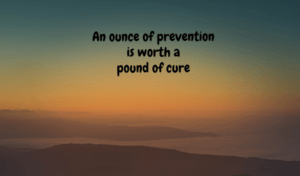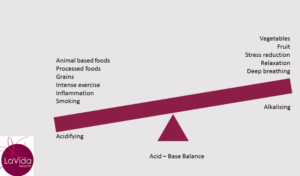The cornerstones of good health are diet, lifestyle and environment (plus a little bit of genetics but that’s for another blog). Sometimes we refer to this as a three-legged stool. If you’ve ever tried to improve your health unsuccessfully, ask yourself if you have missed out one or more of the legs.
This is why, in my naturopathic practice I place a great deal of emphasis on understanding your diet, your lifestyle and your environment; analysing how they might be contributing to your symptoms. Is there something you have been doing (or not doing) which has lead you to this point of ill-health? That’s the real crux of functional medicine. The goal is to identify and remove the triggers, making changes that are sustainable long term with minimal need for ongoing nutritional or herbal supplementation.
You will see the term “diet and lifestyle” thrown around a lot. But what do we mean by this term and what do we mean by your environment? They will be very different from one person to the next. They are unique to you and consequently, your “prescription” for good health should be as individual as you are.
So here are some questions to help you consider the role your diet, lifestyle and/or environment might be playing in your health.
The role of diet in your health
When I refer to diet, I’m referring to everything you consume by way of food and drink. Additionally, you should take into account what you don’t consume as this also forms part of your overall nutritional assessment. Think of it this way; every mouthful you eat or don’t eat is either adding to your ability to have optimal health or making health and vitality harder to achieve.
Often when people think of “diet” they think of a particular type of diet such as a paleo diet, a vegan diet, the Mediterranean diet, a weight loss or weight gain diet, a gluten-free diet, a low FODMAP diet or an auto-immune diet for example.
Regardless of how you label it, what’s important is what you eat, what you don’t eat and what you drink. It’s also important to look at why you choose (maybe even crave) certain foods or why you avoid particular foods.
This is how you have nourished your body up until now.
As a naturopath, I am looking for the clues this information gives me as to whether your diet is providing you with all the nutrients, vitamins and minerals necessary for your body to function at its best. I’m also looking for anything you might be consuming that could be dragging your health down in some way.
This is why I often make use of food diaries as part of my assessment of your case…and the more detail the better.
There is no one “right” or “best” diet. It comes down to what is best for you and your body in the context of your lifestyle. And it’s my job to help you work that out. The closer we can get to optimal for you, the less you need to rely on nutritional supplements.
The effect of lifestyle factors in your health
So what do I mean when I refer to your lifestyle? (And I’m not talking about how glamourous it is).
Basically, it is how you live your life and what is going on in your world. Is your lifestyle supporting your good health or sending you down the slippery slope of disease and ill-health.
Lifestyle is a vital aspect of health that is frequently overlooked.
To reflect on your lifestyle, ask yourself the following questions:
- So, what’s going on in your life?
- What’s your sleep like? Do you feel like you get enough?
- Do you exercise? How often, how much and what type of exercise do you do?
- Do you work? How many hours? Do you enjoy it? Does it nourish you?
- How much responsibility do you carry? Work? Family? Running a home? Finances?
- Do you get the time you need for relaxation? Do you or can you “switch off”? How busy are you?
- What things keep you awake at night? What are your sources of stress?
- How much time do you spend sitting versus standing?
- Do you spend much time travelling or commuting for work?
- Do you do things to nurture your brain or stimulate your mental capacity?
- Do you have good support people around you? Do you have a sense of connection? Are you lonely? Do you have a pet?
- Are there people in your life who are bad for you in some way or maybe drain you? How do you cope with that? Do you have coping strategies?
- What do you do to nourish your spirit? How often do you get to do it?
- Do you smoke? Drink alcohol? Use recreational or pharmaceutical drugs?
- How much time do you get to have fun? What are the things that bring you joy?
- How often do you manage to have a holiday (even for just a couple of days)?
- How often to do you get out in nature (even if it’s just the local park, river, beach?
- And this “biggy”….what’s your purpose? What drives you?
Getting balance in all these areas all the time is pretty much impossible in my opinion but it’s important to identify where there might be areas for improvement. Even small changes can make a big difference. Naturopathically, my job is to identify the problem areas with you and help you work out ways to make them less of an issue.
The impact of your environment on your health
What do we mean by environment? Put simply, it’s the world around you.
It includes:
- Your house and the location it sits in. How old is it? What building materials or furnishings are you surrounded by? Is there mould, dust, chemicals or other possible drivers of illness in your house? Are there animals in the house? Is it in the country or by a busy freeway?
- Do you have ready access to fresh air, clean water, trees and sunshine?
- And the same questions apply to your workplace or anywhere you spend considerable time (e.g. your car).
- What sort of skincare or products do you use on your body?
- How is your food produced? Where does it come from? What was its environment like? How is it prepared? What cookware do you use?
- Do you have quiet space? Are you surrounded by noise?
- What is your exposure to electromagnetic fields (EMFs)? Wifi, phone towers, smart devices, power lines etc.
It doesn’t have to be overwhelming
All these questions apply now and to your earlier life. There’s a lot to consider and it is why we go slowly and why my initial investigation process is a 3-step package completed over the course of a couple of weeks. Usually there are just a few stand-out areas to focus on. We may start with a few dietary changes but recognise that it’s aspects of your lifestyle or environment that really require our attention if we are to achieve sustained improvement for you.
The more I learn and know about good health and vitality the more I understand that the “long way” is in fact the “short cut”. Unfortunately quick fixes are rare, as you have probably already worked out. But it doesn’t have to be overwhelming. We start small, go at your pace and gradually pull it all together
So, if you are struggling with your health make sure the person guiding you (your naturopath, doctor or other healthcare professional) is considering your diet, lifestyle and environment. And if you want to get started on the basics there are some great tips here.






4 thoughts on “Why is good health so hard to achieve?”
Hey, your article was really amazing, informative and very helpful to me.
I am sure you will be posting more informative article in future.
Thanks for sharing with us and keep up the good work.
Thank you Malu
Hi Kaye, thanks for the newsletters. They are always well worth reading. Thanks again for helping fix my gut problems, I’m back to playing Hockey after a 20 year absence!! Maria
Thank Maria for your feedback. I’m glad you enjoy my newsletters and I’m so pleased you gut problems are better. It’s fantastic that you are back playing hockey. cheers, Kaye